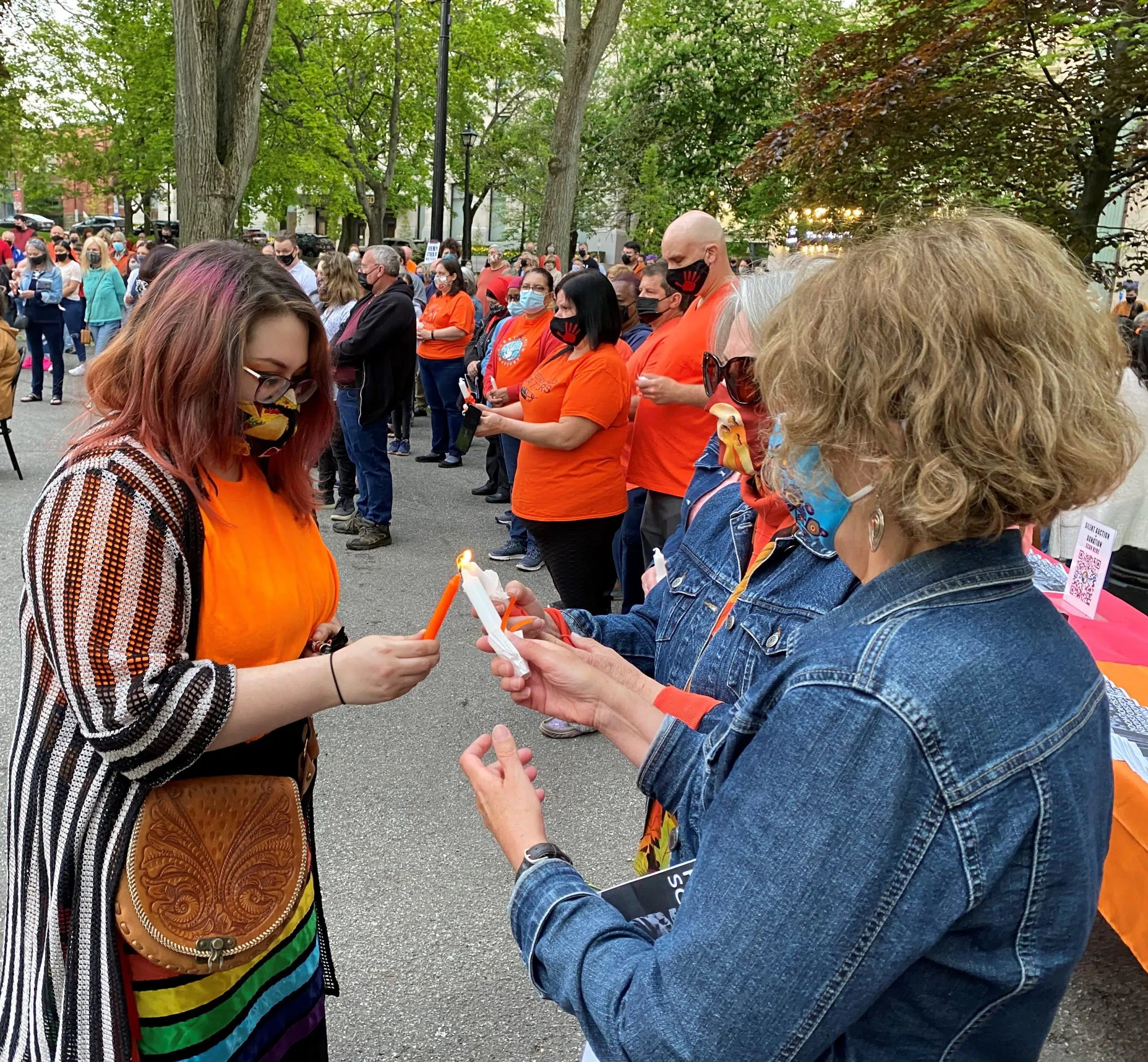
Eastern Circle member Cassandra McLaughlin begins spreading the flame for Sunday's candle-lit vigil. (Image: Ben Burnett)
Hundreds of Saint Johners showed up for a vigil at King’s Square on Sunday evening in memory of the 215 children who were found in a mass grave at the site of a former residential school in Kamloops, B.C.
The event was hosted by Eastern Circle, a local urban Indigenous community group, and featured speeches by group members, songs performed by a drum circle, and a land acknowledgment by outgoing Mayor Don Darling.
“A lot of emotions,” said Eastern Circle member Mykayla Spinney of the event. “You really got to see Saint John come together as a community, and I think that anytime that happens it’s really powerful and beautiful.”
Spinney says as a small city, Saint John rallies together around tragedy.
“That was kind of the most emotional part for our members was we’re here, we’re able to tell our story, and Saint John’s actually here to listen and support our story while we speak it,” she said.
A silent auction to raise money for the Indian Residential School Survivors Society featuring items donated from local shops and artists had raised over $1,400 by the time Sunday’s vigil started.
The recent history of residential schools
The story of residential schools in New Brunswick and across Canada is a tragic one. The school system was a national program of day and boarding schools that were funded by the Canadian government and ran by the Catholic church.
Many Indigenous children were taken forcibly from their families or were given up with the promise of teaching valuable life skills, only to have school administration forbid them from acknowledging their history, culture and language.
Sexual and physical abuse was rampant in the facilities, and many children never returned home, including the 215 children found in the unmarked grave in Kamloops.
Last week, Prime Minister Justin Trudeau accepted the findings of an inquiry into missing and murdered Indigenous women, saying Canada’s treatment of Indigenous peoples “amounts to genocide.” In 2004, the RCMP’s commissioner apologized for the force’s part in residential schools.
The last residential school closed in 1996.
“This was in my lifetime,” said Cassandra McLaughlin, an Eastern Circle member. “Know that we are still out here, fighting to be recognized, and to push the action of reconciliation. Indigenous rights are inherently human rights.”
McLaughlin called on the Trudeau government to end ongoing court battles with residential school survivors.
Eastern Circle member Kateri Hibbert also gave an impassioned speech and spoke about her grandmother, a survivor of the Shubenacadie Indian Residential School.
“This system stole her babies from her in the Sixties Scoop, denied my stolen father his culture and family,” Hibbert said. “This system was designed to destroy me and my family.
“We are still here,” she said to cheers from the audience.
Hibbert called for charges to be levelled against the Catholic church and those who worked in residential schools, many of whom are still alive.
Calls for accountability
Calls for accountability were echoed throughout the vigil.
Spinney said it’s time for the government to stop acting surprised about residential schools and to begin taking responsibility.
“We need them to stop protecting the people that did this, and start protecting the people that are traumatized, who lost their children, who lost their moms, who lost their family because of these tragedies,” Spinney said.
The members of Eastern Circle also hope to enact change locally at the municipal level.
Spinney says their next project will be to petition Saint John’s incoming council to rename Indiantown, a neighbourhood in the old north end.
“It should’ve been renamed a long time ago,” she said. “It’s going to be a big step for Saint John if we can get that to happen.”
“Indiantown references real human beings who lived, and who faced so many issues because of their skin tone and culture. To have (the neighbourhood) still named that in 2021, it’s unacceptable.”
Spinney added she wants the council to implement calls to action from the 2015 Truth and Reconciliation committee.
Provincially, the Eastern Circle member also wants to see better education around Indigenous issues.
During her speech, Spinney said she only learned about the history of residential schools in high school because of a dedicated teacher who advocated for it to be part of the curriculum.
“They need to re-evaluate the education in New Brunswick, in Canada, in Saint John, from elementary all the way to graduates,” she said.
“You’re never too young to learn. You’re never too young to know the truth about what’s happening, and I think that’s the biggest issue we have. People just don’t know because they’re not educated.”






